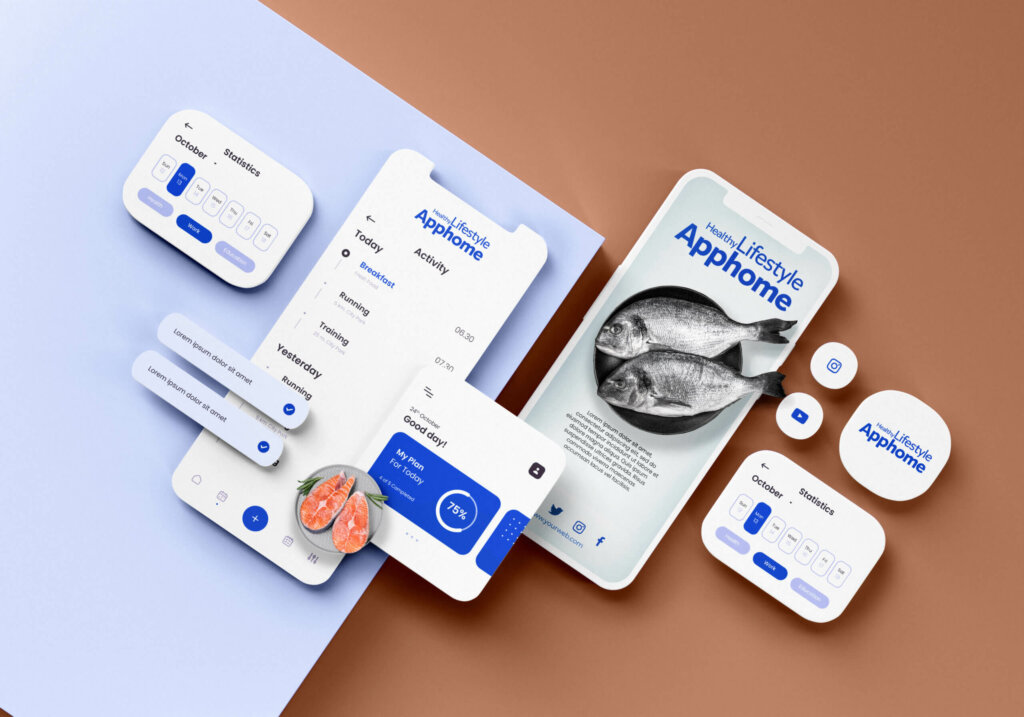Building a successful product that meets consumer demand can be challenging for any tech startup. The risks of investing significant time and resources into a service that may not gain traction or meet market demand are substantial.
This is where the concept of Minimum Viable Product (MVP) development comes into play.
By focusing on building a stripped-back, functional version of the product with the minimum required features, startups can validate their ideas, gather user feedback, and make informed decisions for future development.
In this blog post, we will explore the importance of custom software development in the form of an MVP and how startups can iterate their product before the official launch. We will also discuss why freelance software developers can provide this service at an affordable price.
Why creating an MVP is a crucial part of the software development process

How do you know your app is going to appeal to users?
You might like it, and your intuition regarding its usefulness and appeal to customers could be correct. However, many startups have burned through all their available resources trying to fix bugs and user complaints because they launched too early without a validated idea.
An MVP is like an insurance policy. Sure, you will need to outlay some capital to realize the most basic version of your vision, but this is far better than discovering your idea doesn’t work after hiring staff and investing in marketing and other business processes.
Jumping in 100% could deplete 100% of your resources.
Validating market demand and feasibility
Startups often have assumptions about their target market and the problems they aim to solve. By building an MVP and releasing it to a smaller group of users, startups can gather valuable feedback and insights to validate or challenge their first impressions.
Getting this early feedback loop helps understand user preferences, identify potential improvements, and ensure the product aligns with market needs. By analyzing this data meticulously, startup founders can modify their offering for maximum impact.
Reducing the risk of building a product with no market fit
Developing a product without validating its market fit can lead to wasted resources, time, and effort. MVP development allows startups to mitigate this risk by testing their product concept before investing heavily in full-scale development.
By launching an MVP and observing user engagement and feedback, startups can make data-driven decisions on whether to pivot, iterate, or continue development.
Cost and time efficiency
Most new startups often have limited budgets, and investing significantly in building fully-featured, custom software development can be financially burdensome.
By adopting an MVP approach, startups can focus on building and launching the core functionality of their product, thereby reducing development costs. This lean development strategy helps allocate resources wisely and provides an opportunity to secure additional funding based on the validated MVP.
Accelerating time-to-market
Building an MVP prevents the need to play the guessing game.
While building a pre-version of the final product may seem to extend the time-to-market, the reverse is true.
MVP development allows startups to launch a functional product version sooner, enabling them to gain a competitive advantage and capture early adopters. By prioritizing the essential features, startups can deliver value to their users faster and refine their product based on real-world usage.
Iterative improvement and learning
User feedback is invaluable in understanding the strengths and weaknesses of a product.
By releasing an MVP, startups can gather feedback directly from their target audience and use it to enhance their product. This iterative approach enables startups to build new features and make improvements that genuinely resonate with users, leading to a better overall user experience and increased customer satisfaction.
Prioritizing features based on actual user needs
While an MVP is just a starting point, it helps startups avoid the common trap of building features based on assumptions rather than actual user needs.
Launching a stripped-down version of their product allows startups to identify the most valuable features based on user feedback and data. This approach ensures that resources are focused on developing features that users find most compelling, resulting in a product that aligns with customer expectations and demands.
Critical elements of an MVP

There are three key components that talented developers focus on when designing the perfect tech solution for tech startups; core functionality, user experience, and scalability. In this phase of software development, the goal is to have a product that collects as much information as possible while still providing the user with some value.
Core functionality
When developing an MVP, it is crucial to identify and prioritize the core functionality that solves a specific problem for the target audience. Instead of aiming to solve multiple user pain points that add little to no value, founders can identify features that give their product the best chance of seeing success.
By honing in on solving a specific problem, startups can demonstrate the value of their product and gather relevant feedback from users.
User experience and interface
User experience (UX) plays a crucial role in the success of any product. Creating a simple and intuitive design for an MVP is essential for users to navigate and interact with the product quickly.
The goal is to exponentially attract a robust consumer base by promoting user satisfaction. This, in turn, increases the chances of user retention, lead generation, and conversions.
A smooth user journey is vital in guiding users through the product and ensuring they can easily accomplish their goals. Startups should carefully consider the user flow and remove any unnecessary steps or complexities.
With artificial intelligence and machine learning playing a more significant role in custom software development, UX is more important than ever.
Scalability and extensibility
While an MVP focuses on building the minimum required features, it is crucial to consider the long-term vision for the product.
Startups should develop a scalable architecture to accommodate future feature enhancements and expansions. This ensures that as the product gains traction and evolves, it can quickly adapt to new requirements without requiring significant rework or rebuilding from scratch.
Startups should also anticipate potential integrations with third-party services or future expansions of their product offering. By designing the MVP with flexibility in mind, startups can seamlessly integrate additional features or services as their business grows without disrupting the existing user experience.
This proactive approach allows startups to scale their product effectively and meet evolving market needs.
The role of freelance software developers in MVP development

Managing resource allocation is a constant struggle for small businesses and new startups trying to bootstrap their business. Many don’t have the cash on hand to hire from the top software development companies.
The alternative is looking on the open market for freelance software development services for technical expertise to get your MVP over the line. There are hundreds of great options on many different freelance marketplaces.
Here are a few reasons to check out the open market for your early-stage startup before hiring developers from expensive software development companies.
Cost-effectiveness
Freelance software developers often offer their services at more affordable rates compared to established agencies or hiring in-house development teams. Startups can leverage this cost advantage to keep their development expenses in check while still accessing top talent.
In addition to the cost savings, freelancers typically offer flexible payment models, such as hourly rates or fixed project rates, allowing startups to choose the most suitable option based on their budget and project requirements.
Diverse skill sets and expertise
Freelance platforms provide startups access to diverse software developers with various skill sets and expertise. Startups can hire developers specializing in developing MVPs using a specific tech stack for similar industries or business models.
Many software developers offer the advantage of matching specific project requirements. Startups can search for freelancers with experience building digital projects relevant to their industry. This tailored approach ensures that startups can find freelancers who understand their unique needs and can deliver the desired results.
Speed and efficiency
Freelance software developers often embrace agile methodologies, promoting iterative development and quick delivery.
Software developers are accustomed to jumping into projects quickly and adapting to new environments. They can seamlessly integrate with startup teams, enabling startups to ramp up development efforts rapidly when needed.
This agility allows startups to scale their development capacity efficiently without the overhead of hiring and training additional in-house resources.
Finding and Engaging Freelance Software Developers

There are a few pitfalls when looking for freelance talent online. For every superstar, there are several pretenders. Cheaper is cheaper, and marketplaces don’t do their due diligence when assessing skills. This part is up to you.
If you don’t know precisely what you are looking for when looking to create your MVP, then rushing to a decision is ill-advised.
Platforms and marketplaces
Several platforms and marketplaces cater specifically to connecting startups with freelance software developers.
When searching for freelancers, startups should invest time researching and vetting potential candidates. Reviewing their portfolios, checking client feedback, and assessing their fit with the project requirements and startup culture is essential.
Conducting interviews or small test projects can also help gauge their technical skills and communication abilities.
Building a solid project brief
Startups should create a comprehensive project brief outlining the MVP’s objectives, desired features, and scope. The brief should provide freelancers with a solid understanding of the startup’s vision, target audience, and market niche.
Effective communication is crucial in software development. Startups should clearly communicate their expectations regarding project timelines, deliverables, and milestones. This ensures that both parties are aligned and can work towards the same goals.
Collaboration and communication
Startups should establish efficient communication channels with their freelance developers. This may include regular video or voice calls, instant messaging, or project management tools. Clear communication ensures that both parties stay updated on progress, promptly address concerns or questions, and maintain a strong collaborative relationship.
Maintaining a regular cadence of updates and feedback loops is essential in the MVP development process. Startups should provide timely feedback on the work delivered by freelancers and encourage open communication.
Successful startups that utilized MVP development

Do you want to know one thing that all successful startups have in common? They validated their concept with an MVP before they went to market with the complete service. By checking core functionality, user experience, and scalability in the initial phase, they collected significant data that could inform later decision-making.
Uber
The primary feature of the Uber app MVP centered around a simple functionality: booking a ride. Users could specify their location within the app or send an SMS text, and Uber would dispatch the nearest available cab to the rider’s location.
By launching in a limited market and gathering user feedback, Uber validated the concept of on-demand transportation and identified areas for improvement. This MVP approach allowed Uber to pivot, iterate, and scale rapidly, eventually becoming a global transportation giant.
Airbnb
Airbnb launched with an MVP that allowed homeowners to rent out their spare rooms.
Back then, they were known as Airbed & Breakfast, and the founding team focused on a specific target audience: tech conference attendees at a single sold-out conference. They intentionally kept the website simple, without robust features such as multiple dates, locations, or price options.
The goal was to validate a simple assumption: whether there was sufficient demand for their offering.
By releasing a basic version and gathering user feedback, Airbnb refined its user experience, added features based on market research and user demands, and expanded into a global accommodation marketplace. This MVP-driven approach enabled Airbnb to disrupt the traditional hospitality industry.
Quickly Hire: A network of software developers with MVP experience

As you can tell, MVP development plays a crucial role in the success of new tech ventures.
Focusing on building a functional version of the product with the minimum required features has become a mainstay of how small startups become major market disruptors.
One of the best ways to get to this stage is by hiring a freelance developer who provides an affordable solution for startups seeking MVP development services.
At Quickly Hire, we have a vast network of talented developers from around the world, many with extensive experience creating MVPs for clients that later become upgraded into fully-fledged digital products.
Adept at working within the startup environment, our freelancers are a cost-effective and productive option for startups who must manage their resources effectively for maximum impact.
Instead of engaging with an expensive software development company, hiring in-house developers, or hopelessly searching job boards on more popular freelance marketplaces, reach out to us and enquire about how we can help. Our team will ensure you have someone who meets your needs exactly without the pain of hiring, onboarding, vetting, and compliance issues.

